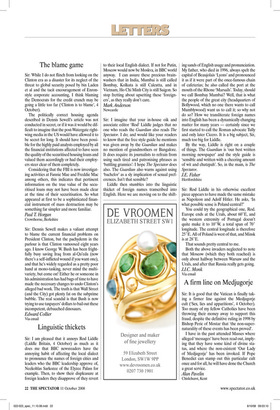Linguistic thickets
Sir: I am pleased that it annoys Rod Liddle (Liddle Britain, 4 October) as much as it does me that BBC newsreaders have the annoying habit of affecting the local dialect to pronounce the names of foreign cities and leaders who the BBC leadership approve of, Neekohlas Sarkozee of the Elyzee Palass for example. Then, to show their displeasure at foreign leaders they disapprove of they revert to their local English dialect. If not for Putin, Moscow would now be Moskva, in BBC world anyway. I can assure these precious brainwashers that in India, Mumbai is still called Bombay, Kolkata is still Calcutta, and in Vietnam, Ho Chi Minh City is still Saigon. So stop fretting about upsetting these ‘foreigners’, as they really don’t care.
Mark Anderson
Newcastle
Sir: I imagine that your in-house oik and associate editor ‘Rod’ Liddle judges that no one who reads the Guardian also reads The Spectator. I do; and would like your readers to know that the free style guide he mentions was given away by the Guardian and makes no mention of grandmothers or Bangalore. It does require its journalists to refrain from using such tired and patronising phrases as ‘battling grannies’: I hope The Spectator does also. The Guardian also warns against using ‘bachelor’ as a sly implication of sexual preferences. Isn’t that sensible?
Liddle then stumbles into the linguistic thicket of foreign names transcribed into English. Here we are moving on to the shift ing sands of English usage and pronunciation. My father, who died in 1996, always spelt the capital of Beaujolais ‘Lyons’ and pronounced it as if it were part of the once-famous chain of cafeterias; he also called the port at the mouth of the Rhone ‘Marsails’. Today, should we call Bombay Mumbai? Well, that is what the people of the great city (headquarters of Bollywood, which no one there wants to call Mumblywood) want us to call it; so why not do so? How we transliterate foreign names into English has been a dynamically changing matter for many years — certainly since we first started to call the Roman advocate Tully and only later Cicero. It is a big subject, Sir, much too big for Liddle.
By the way, Liddle is right on a couple of things. The Guardian is ‘our best written morning newspaper’ and the style guide is ‘sensible and written with a cheering amount of wit and chutzpah’. So, in the main, is The Spectator.
J.E. Fisher
Hertfordshire
Sir: Rod Liddle in his otherwise excellent piece appears to have made the same mistake as Napoleon and Adolf Hitler. He asks, ‘In what possible sense is Poland central?’ You could try the geographical one, Rod. Europe ends at the Urals, about 60°E, and the western extremity of Portugal doesn’t quite make it to 10°W, a total span of 70° longitude. The central longitude is therefore 25°E. All of Poland is west of that, and Minsk is at 28°E.
That sounds pretty central to me.
Both the above invaders neglected to note that Moscow (which they both reached) is only about halfway between Warsaw and the Urals, and after that Russia really gets going. J.J.C. Monk
Via email










































































 Previous page
Previous page